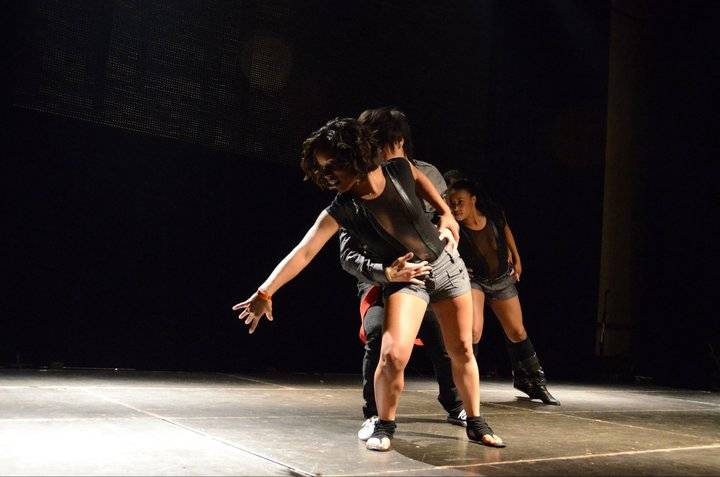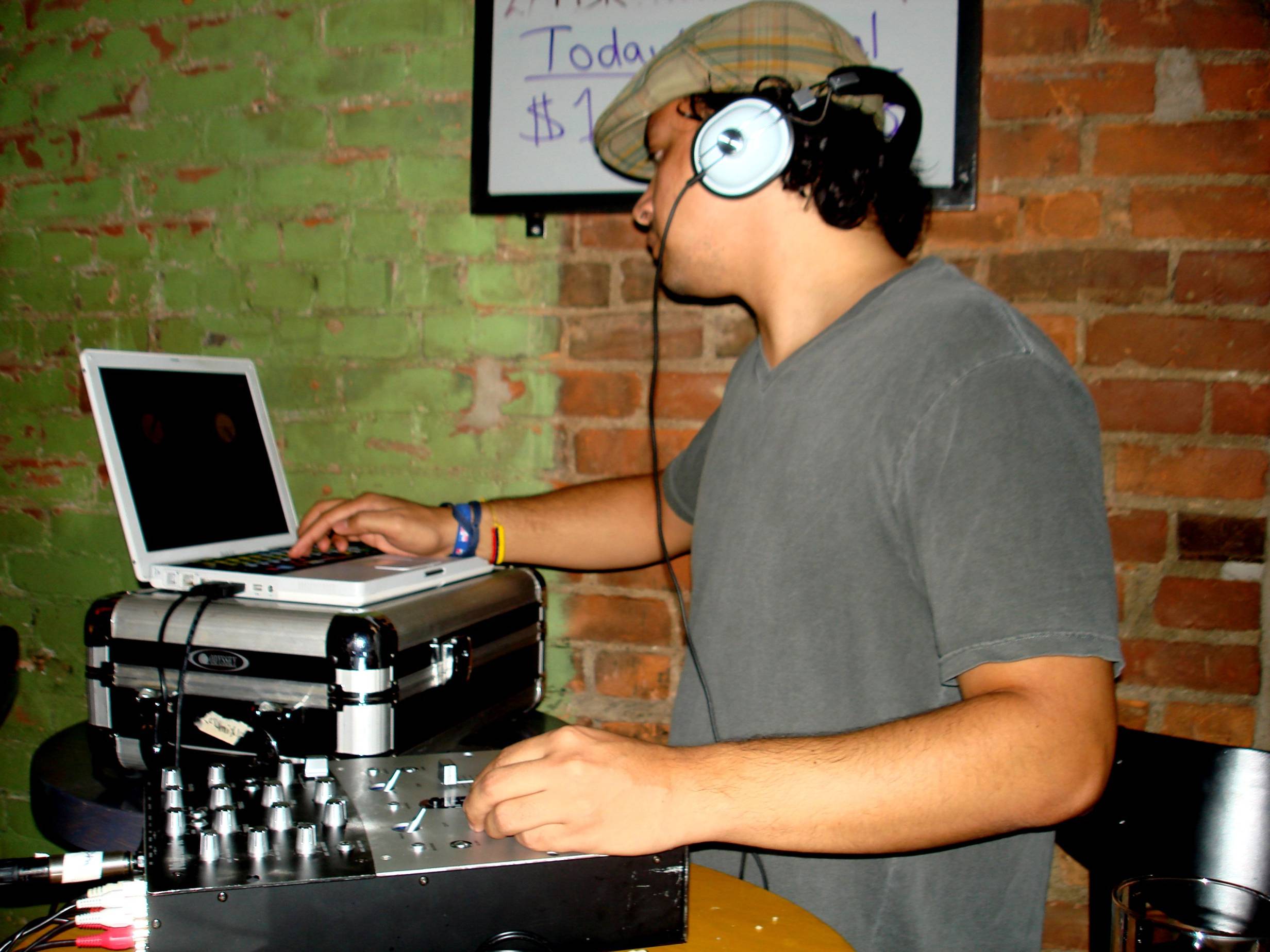Though Colombian-born Urbana resident Bris Mueller Garcés wears multiple hats in the Champaign-Urbana (C-U) salsa dance community, he is seldom recognized for his most important role – and no, he isn’t C-U’s best dancer.
 Mueller is the C-U salsa community’s catalyst, mobilizing its members through a combination of his work as a salsa deejay and event organizer, in addition to having presences as a dancer and conflict mediator on the salsa scene.
Mueller is the C-U salsa community’s catalyst, mobilizing its members through a combination of his work as a salsa deejay and event organizer, in addition to having presences as a dancer and conflict mediator on the salsa scene.
In 1994, when Mueller initially got involved in the C-U salsa dance community, “it exploded,” explained his mother Sevy Mueller. With the exception of a recent two-year trip to Shanghai with fiancée Erin Chiou, Mueller’s role as the driver of the C-U salsa scene has been consistent – and it has proved to be vital to the community’s strength and vibrancy.
Upon returning from Shanghai in October 2010, Mueller created a Facebook group called “Salsa Champaign” in an effort to reinvigorate a local salsa scene that, without him, had begun to droop. He was successful.
But Mueller is now moving to Chicago to live with Chiou, and the question of how the C-U salsa community will function without him is burning strong.
According to “Salsa Champaign,” the local salsa dance community has about 280 active members. The next largest local salsa dance community is in Peoria, Ill., while the largest in Illinois can be found in Chicago. Nationally, salsa’s presence is huge on the East and West Coasts, and Los Angeles, Miami and New York each claim their own nationally recognized styles of salsa dancing.
But salsa dancing was not Mueller’s first love; the dark-haired, goofy-smiled 31-year-old showed early signs of interest in the sciences. From Mueller’s dissecting and reassembling of his mother’s appliances to his concocting of salt, sugar, vinegar and oil recipes for his younger brother’s consumption, it quickly became obvious to his family members that he had an interest in learning how things work.
And it wasn’t until his mother told a teenage Mueller that she wanted him to learn to salsa dance that he took any real interest in the form. But Sevy’s gentle suggestion and some at-home dance lessons were all it took to spark Mueller’s curiosity – and the rest is history.
Sevy taught Mueller the Colombian style of salsa dancing – a style that breaks on a diagonal instead of straight back and forth; when Mueller hit the scene in 1994, Colombian was the salsa dance style of choice for C-U residents. The local scene has since transitioned into New York, or “slot,” style dancing.
Learning without any formal training, Mueller is what one would call a “cultural” salsa dancer. And dancing salsa – like all of Mueller’s other experiments – had a clear “Aha!” moment for the teenage inquisitor.
“One day [salsa dancing] just clicked,” he said. “I didn’t know how to do a bunch of turns, but I did it right once, and it clicked. It was a muscular memory kind of thing.”
Mueller explained that because he had no mirrors to use while learning, he “did things that felt good.”
“I didn’t know what [my dancing] looked like, so I would dissect other people’s movement and learn that way,” Mueller said. “I learned most of my body movement from my partner…so I move like a girl sometimes.”
Mueller explained that the one clear difference between him as a cultural dancer and those dancers who are trained formally is that he has difficulty learning choreography.
“[Everything I have learned] falls apart when I try to learn solo choreography,” he said. “I don’t have the same way of understanding movement [as formally trained dancers].”
When Mueller joined Dance2XS Caliente (then called Combo Caliente) upon the request of group founder Lena Hayden, his experience of salsa dancing drastically changed; Mueller was forced to relearn to salsa, this time in a New York style, and to learn choreography at a rapid pace.

photo by Erin Chiou
“Once I started formalizing my dance training and formalizing my style, that was difficult… mainly because I was dancing with beginners,” Mueller said. “At the time, Lena had no ideas about how to teach salsa formally, and dancing with Combo Caliente was the only formal training I had.”
Mueller explained that there were many arguments at practice about what was the “right way” of salsa dancing.
“You can’t tell me that [dancing in the Colombian style] is wrong…I am giving you the benefit of the doubt if you are teaching me something,” he said.
Mueller added that he believes that a lot of personal development happened for him in Combo Caliente practices; it was there that he honed his skills in trying to understand other people and to explain why things were not right or wrong.
It is for that reason that Mueller is so comfortable in his roles of mediator and overseer of the salsa dance community.
Mueller explained that in any given organization or community, it is important to have an expert; that person, he said, can act as a behavioral example for everyone else involved.
“I am pretty manipulative in the salsa community, in a sense. I think the role that can be most useful in the salsa community is that of the expert… so I have kind of tried to take that position,” Mueller said. “If there is an issue, I can be the person who can settle it.”
Mueller added that he thinks most people in the salsa community perceive him as being the “go-to” guy if they have a complaint or a problem that needs solving.
“In some cases, I am able to stand in between the complaints that people have and their recipients, and [I am able] to get something done– whether [the issue] is with a venue or with a certain group’s behavior at salsa events,” Mueller said. “People in the salsa community have to be able to talk to someone when tensions arise…They are always looking for the person they can yell at – the person in charge – when they have a problem. It is sort of like I am the human relations department.”
Mueller described himself as being the “lubricant” during times of conflict.
“I help people communicate more easily,” he said. “I don’t pick sides, which is best for everyone involved.”
And that skill transitions smoothly into his personal life as well; both Mueller and his fiancée have noted his empathetic, human approach to conflict resolution.
“Sometimes Bris (pronounced BREESE) catches me off-guard by noticing something I didn’t about a situation, and rather than tell me, he shows me how I may have reacted in a bad way,” Chiou said. “I think that is a generous and kind way…to call your friends on their crap.”
Mueller explained that in confronting a loved one about an issue, a person is faced with two options – either to attack the problem head-on, or to suggest a change and hope the loved one takes the initiative to make it.
“I once dated someone who bought me a whole wardrobe,” he explained in illustration of his point. “I was like, ‘I get it…you don’t like how I dress.’”
Based on that negative experience and on the way he was raised, Mueller said he prefers the opposite approach.
“I try very hard to not meddle in other people’s development…If I’m going to meddle, it is because I feel that it would be hypocritical of a person if I did not,” he said. “It is my reaction to how my parents are…They play an active role in everything. I am trying not to be like that.”
That mindfulness has helped to shape Mueller’s relationship with Chiou.
“I think the way I talk to Erin goes back to trying not to be a catalyst of change – I just want to be a catalyst of her thinking,” he said. “I think Erin is someone who wants to grow and understand herself and her surroundings more – she is smart enough to figure it out on her own.”
And Chiou spoke fondly about Mueller’s emotional, social and cultural awareness.
“The best thing about having Bris in my life is that he helps me see the world in a different way – in a way that makes me a better person,” she said.
But that same seemingly positive trait – a heightened sense of self-awareness – largely contributes to Mueller’s self-consciousness.
“Overall, I think I realize that a lot of things are very invisible to me – that there are some things I can’t help,” he said. “Seeing whatever ways I am sexist, racist, elitist, et cetera…those things make me self-conscious.”
Laughing, Mueller added that he is also a “reverse snob.”
“If something is very good, I might say that it is not good,” he said. “I don’t really know why.”
Friend and former Dance2XS Caliente teammate Lena Hayden noted that Mueller’s nonchalance can sometimes read as selfishness.
“Sometimes I can’t tell if he is being selfish or just putting something off,” she said. “One year when [Dance 2XSCaliente] performed in Urbanite, I asked Bris to do the cut for our music, and he asked when I needed it instead of saying, ‘Yes,’ right away…Now I ask when I can get it instead of giving him a date. If he won’t get it done on time, I ask someone else.”
Sevy agreed that her son’s biggest challenge is time-management.
“He is much better than he used to be, but Bris has never been a good time manager,” she said. “When he has to leave, he goes back to the house three times because he forgets the key, or his wallet or something else. To me it is funny.”
In contrast, Sevy said that the best thing about Mueller is his outgoing personality.
“In some ways [Bris] is a carefree person,” she said. “He is very open-minded, but at the same time, he cares a lot about the people around him and about what he does with his life.”
Hayden echoed Sevy’s words.
“The best thing about Bris is that he appears to be carefree about a lot of things,” Hayden said. “He doesn’t really sweat the little things at all.”
Hayden explained that Mueller was one of the eight original members of Combo Caliente, the present-day Dance2XS Caliente.
“I used to stress and kill myself over stuff for the group,” she said. “Bris handled the business side of things and was always really neutral about it. He is great in stressful situations…He can kind of go with anything.”
CUATSALSA teacher Mügé Dizén and her colleague Yuri Sohn noted that Mueller is a “great lead” – both on the dance floor and off.
“Bris really is a large figure in keeping the salsa scene in C-U flourishing,” Sohn said. “He is a good deejay too.”

Dizén explained that Mueller takes the feedback he gets from the Salsa Champaign Facebook group and from other community members, and really works to implement it.
Mueller commented on the important role that Facebook has played in his experience of the Champaign salsa community.
“There is no way that I could’ve imagined connecting to this community after being gone for two years if it weren’t for Facebook,” he said. “Most of the people I knew had long left.”
Sevy noted that the Champaign salsa community was not nearly as vibrant before her son got involved in it.
“I remember going to salsa 20 years ago, and there was this little place that nobody knew about,” she said. “I think Bris was the one who really made salsa known in this community…The whole thing exploded when he started teaching.”
Mueller explained that in 1994, a man named Carlos Varela was teaching salsa in C-U.
“Carlos would have, like, 300 people in his class,” Mueller said. “He would deejay, and he did a great job at getting people’s contact information…but when he left, [the salsa scene in Champaign] was like a vacuum.”
Instead of creating an open forum with the contact information he had gathered, Varela gave everyone’s contact information to two men who taught at the Regent Ballroom when he moved away, Mueller explained.
“They did salsa at the Regent on a weekly basis, and all of the other places on campus shut down…We went from having salsa every night of the week to not having anything,” Mueller said. “I then took it upon myself to try to organize salsa events in the campus community.”
Mueller began teaching salsa at Highdive and continued to teach there for many years.
“I figured out that I needed to teach salsa to continue to supplant the community here,” Mueller said. “[The C-U salsa community] is cyclic; it is constantly falling apart because people are graduating and moving away.”
And that group of people includes Mueller; he and Chiou spent October 2008-October 2010 in Shanghai, and the pair is now moving to Chicago.
 Mueller explained that when he came back to Champaign from Shanghai, he wanted to do what he could to contribute to the C-U salsa community.
Mueller explained that when he came back to Champaign from Shanghai, he wanted to do what he could to contribute to the C-U salsa community.
“There was no role for me in the salsa community in Shanghai…I wasn’t in a position to better anything,” he said. “When I came back [to Champaign], I saw the state of things. Since then, I have made my own tweaks to what I have direct control over, and I have tried to create more community.”
Mueller said that he thinks he has inspired other people in the C-U salsa community to play a more active role in making sure that the environment stays positive. But that doesn’t mean that his absence won’t have a strong impact on those C-U salseros who remain.
“I think some things will fall apart [when I move to Chicago] because there isn’t some centralized person looking over the salsa community,” Mueller said. “There won’t be somebody to run things by, and people will be trying to rebalance the overall dynamic.”
His mother expressed similar feelings.
“I think the salsa community will continue without Bris,” Sevy said, “but it hasn’t even been the same since he went to Shanghai… I have to wonder if [the community] will stay the same or get worse when he leaves. I definitely don’t see it growing.”
But Mueller said that he does not have anxiety about leaving the salsa scene in C-U.
“There are a lot of things that I have left behind [during my life],” he said. “But in Champaign… this is my community. I don’t feel like I ever really leave it.”
And in the strong foundation he has built here for salsa dancing, Mueller has ensured that his presence will resonate in C-U long after he has moved away.








